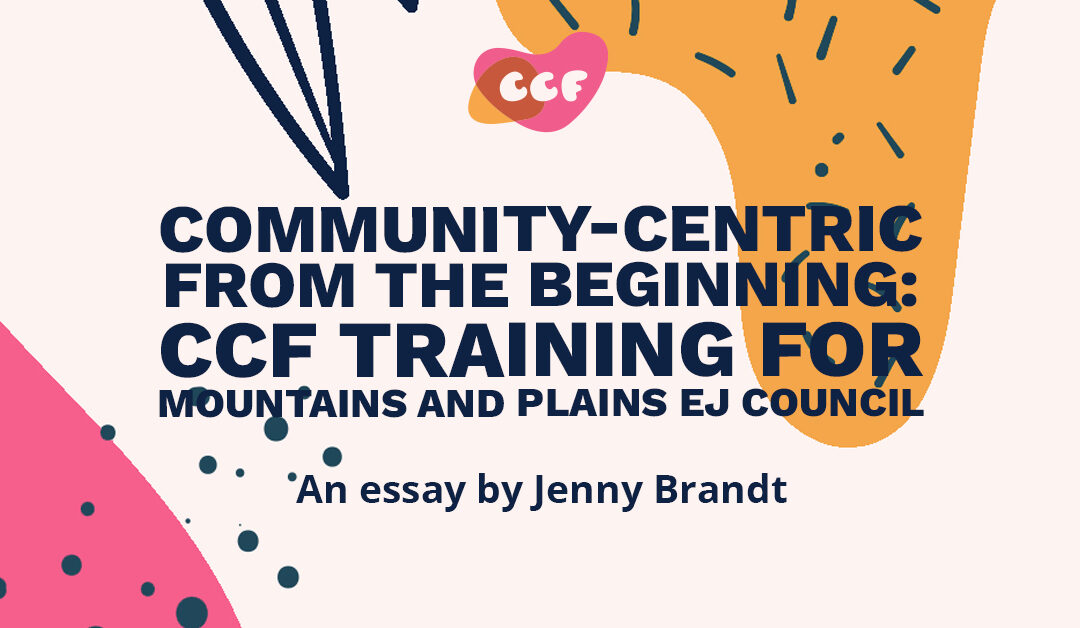By Jenny Brandt, member of CCF Global Council and co-lead of membership team
The Environmental Protection Agency (EPA) is going to be granting $600 million dollars to disadvantaged communities in the US over the next three years via the Environmental Justice Thriving Communities Grantmaking (EJ TCGM) program. They have selected 11 organizations to distribute these funds. JSI – a global nonprofit dedicated to improving lives around the world through greater health, education, and socioeconomic equity for individuals and communities – is the designated Mountains and Plains EJ Grants Hub that will be distributing these funds within EPA’s Region 8 which includes: Utah, Montana, Wyoming, Colorado, North Dakota, South Dakota, and 28 federally recognized Tribes.
Community-Centric Fundraising (CCF) is a thought partner and trainer for the MAP EJ Grants. Three Global Council members – Esther Saehyun Lee, Meena Haque, and I – attended their in-person training in Denver, CO, on October 8-10. We led various sessions to introduce the EJ Council to our Principles to ground their grantmaking in equity.
Experts themselves, the EJ Council shared their experiences with funders who earned and lost their trust. Together, we came up with the Council’s values of solidarity and integrity, we imagined what success for the region would look like beyond the lifecycle of this grant, and we led a session about rest.
The EJ Council will score grant applications during at least three grantmaking cycles between now and December 2027. The first grant cycle opens on October 28 and closes Dec. 12, 2024. You can sign up for updates on their website here.
The council members helped in the overall strategy, and the applications are designed to be more accessible than Federal grants typically are.
The community partner organizations from the region are the Cheyenne River Youth Project, Dakota Resource Council, Healthy Environment Alliance of Utah, Montana Watershed Coordination Council, Wyoming Outdoor Council, Green Latinos, Womxn from the Mountain, North Dakota Native Vote, and Montana Association of Conservation Districts.
Interested in applying for funding? Here’s what you need to know.
The communities eligible for these grants can be determined using the IRA Disadvantaged Communities Map.
These designations are based on calculations determined by the Climate and Economic Justice Screening Tool (CEJST), which was created to help guide 40% of the overall benefits of investments in climate, clean energy, and related areas to disadvantaged communities as part of the “Justice40” Initiative created in President Biden’s Executive Order 14008.
Communities that reside in disadvantaged areas can apply for funds to address the following:
- Air quality and asthma
- Fence line air quality monitoring
- Monitoring of effluent discharges from industrial facilities
- Water quality & sampling
- Small cleanup projects
- Improving food access to reduce vehicle miles traveled
- Stormwater issues and green infrastructure
- Lead and asbestos contamination
- Pesticides and other toxic substances
- Healthy homes that are energy/water use efficient and not subject to indoor air pollution
- Illegal dumping activities, such as education, outreach, and small-scale clean-ups
- Emergency preparedness and disaster resiliency
- Environmental job training for occupations that reduce greenhouse gases and other air pollutants
- Environmental justice training for youth
Funding will be awarded in these formats:
- Tier 1 Assessment Projects up to $150,000 (1 year)
- Tier 2 Planning Projects up to $250,000 (1-2 years)
- Tier 3 Development of Projects up to $350,000 (2 years)
- A limited number of $75,000 non-competitive fixed-amount subawards will be available for severely capacity-constrained CBOs to access.
The Mountains and Plains EJ Grants Hub will support you from the point you are funded. If your application is not funded, they will set up a session with you to go over your application and what would make it stronger (if you wanted to resubmit it in a future round of applications).
If you need assistance prior to that point, you should contact the local the Mountains and Plains Thriving Communities Collaborative, the region 8 Thriving Communities Technical Assistance Centers (TCTAC pronounced “tic-tac”). Learn more about Montana State University’s MaPTCC pronounced “map-tek”) and the services they can provide here.
If you and the communities you work with are not in region 8, you can find grant makers as well as a national grant maker for your region and the supporting Thriving Communities Technical Assistance Centers (TCTAC) below:
| Region | Grantmaker | EJ TCTAC(s) |
| 1 — Serving CT, ME, MA, NH, RI, and VT. | Health Resources in Action (HRiA) | Institute for Sustainable Communities |
| 2 — Serving NJ, NY, Puerto Rico, the U.S. Virgin Islands, and 8 federally recognized Indian Nations. | Fordham University |
West Harlem Environmental Action, Inc. (dba WE ACT for Environmental Justice) and Inter-American University of Puerto Rico-Metropolitan Campus |
| 3 — Serving DE, DC, MD, PA, VA, WV, and 7 federally recognized Tribes. | Green & Healthy Homes Initiative Inc. | National Wildlife Federation |
| 4 — Serving AL, FL, GA, KY, MS, NC, SC, and TN. |
Research Triangle Institute |
Research Triangle Institute (RTI International) and |
| 5 — Serving IL, IN, MI, MN, OH, and WI. | The Minneapolis Foundation |
and |
| 6 — Serving AR, LA, NM, OK, and TX. | Texas Southern University |
Deep South Center for Environmental Justice (DSCEJ) and |
| 7 — Serving IA, KS, MO, and NE. | Research Triangle Institute (National Grantmaker) | |
| 8 — Serving CO, MT, ND, SD, UT, and WY. | JSI Research and Training Institute | |
| 9 — Serving AZ, CA, HI, and NV. | Social and Environmental Entrepreneurs (SEE), Inc |
and |
| 10 — Serving AK, ID, OR, WA, and 271 Native Tribes. | Philanthropy Northwest |
and |
| NATIONAL Regions 1-3 | Institute for Sustainable Communities (ISC) |
(See above) |
| NATIONAL Regions 4-7 | Research Triangle Institute |
(See above) |
| NATIONAL Regions 8-10 | Climate Justice Alliance |
(See above) |

Jenny Brandt
Jenny Brandt (she/her) is a member of the Global Council at CCF. She is a co-lead of the Membership and Regional team and is building the network in Latin America.
Her career in non-profit organizations has focused on building equitable access for Latino communities to health, economic justice, advocacy, jobs within the Federal government, environmental justice, resources, and conservation.
She currently resides in Chetumal, Mexico, where she loves taking photographs. You can find her on Linkedin here.
Discover more from CCF
Subscribe to get the latest posts sent to your email.

